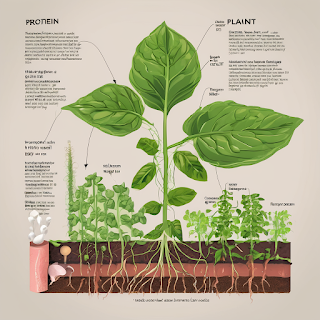Unlocking Agricultural Mysteries: A Deep Dive into Metaproteomics
As a young farmer passionate about agroecology and the wonders of nature, I'm always exploring new areas of research that could help me better understand and nurture the life in my soils. One exciting field is metaproteomics - studying the collective protein profiles of entire microbial communities and their interactions. Harnessing insights from this emerging "omics" approach offers hope to strengthen agroecosystem resilience worldwide.
In this article, I'll share perspectives on metaproteomics' potential role in sustainable agriculture after attending conferences and reading widely. While acknowledging challenges ahead, I believe this knowledge holds promise when guided responsibly with farmer priorities in mind. My hope is open dialogue maximizes benefits of microbial discoveries for small-scale food production globally.
Revealing Hidden Worlds
We now know soil isn't just a medium for plant growth, but rather a complex living system composed of trillions of microbes from bacteria and fungi to protozoa. These soil organisms drive nutrient cycling, decompose organic matter, protect plants from pathogens and influence overall ecosystem functioning.
Yet traditional methods could only study microbes one species at a time, overlooking their interactions as dynamic communities. Metaproteomics analyzes all proteins present in an environmental sample like rhizosphere soil simultaneously using mass spectrometry. This reveals which microbial functions are actively expressed based on prevailing conditions - insights not possible before.
Delving into the intricate world beneath our feet, metaproteomics emerges as a groundbreaking frontier in agricultural research. As a young farmer with a passion for agroecology, my exploration of this field has opened doors to understanding the complex relationships within soil microbial communities. In this article, we'll unravel the potential of metaproteomics in sustainable agriculture, exploring its applications and the transformative impact it could have on small-scale farming globally.
The Hidden Microbial Realms
Traditionally viewed as a mere growth medium for plants, soil is now recognized as a living ecosystem teeming with trillions of microorganisms. Metaproteomics allows us to shift our focus from individual species to studying entire microbial communities concurrently. By employing mass spectrometry, this 'omics' approach analyzes all proteins within an environmental sample, offering unprecedented insights into microbial functions actively expressed under specific conditions.
For instance, a study showcased the identification of over 500 fungal and bacterial proteins involved in nitrogen fixation when alfalfa was present, contrasting with bare soil. These revelations redefine our comprehension of belowground processes essential for sustaining plant health and productivity in diverse agroecosystems.
Empowering Smallholders through Insights
Metaproteomics holds significant promise for small-scale farmers aiming to enhance soil resilience with minimal external inputs. Understanding how microbial communities respond functionally to different management practices provides valuable information for optimizing nutrient cycling, disease resistance, and stress tolerance through ecological intensification.
Collaboration among regional networks comprising farmers, researchers, and extension agents can leverage shared metaproteomics infrastructure. Participatory analyses of on-farm trials may guide locally-adapted soil stewardship, specifically tailored to climate vulnerabilities. Open-access 'omics' databases could facilitate accelerated knowledge-sharing on a global scale.
Embarking on Initiatives
Excitingly, initial metaproteomic projects are already underway, directly involving smallholder cooperatives in on-farm research. These initiatives strive to fortify agroecosystem functions through ecologically-based intensification, providing tangible evidence of the transformative potential of metaproteomics.
Navigating the Future
As we navigate the path ahead, engaging in open and evidence-based discussions around technical, ethical, and regulatory considerations is crucial. Balancing the tremendous potential of 'omics' approaches like metaproteomics with ethical responsibility is essential. By integrating farmers as equal partners, these methodologies can revolutionize agroecology and contribute significantly to global food security.
Inclusive Exploration
In conclusion, our journey into metaproteomics and the secrets of life beneath the soil is a collaborative one. Sustainability hinges on fostering a cooperative spirit that acknowledges the well-being of both people and the planet. By embracing diverse perspectives, we can walk this exciting path together with trust and care, unlocking the mysteries of agriculture for a better future.

Post a Comment